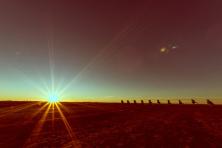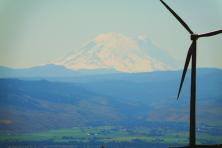The Dept. of Ecology is holding public hearings on its Clean Fuel Standard on Feb. 19 and 23 (details below).
In 2008, Washington state lawmakers put in place goals for reducing greenhouse gas pollution, goals which remain unmet seven years later. While much of our state enjoys relatively clean energy from hydroelectric and other sources, we are still deeply reliant on fossil fuels—especially in our transportation system. That's why the Department of Ecology this week issued a draft Clean Fuel Standard. If the plan mirrors successes in other states, it would be a great boost for Washington's clean energy economy, public health, and climate stability.
The Clean Fuel Standard (CFS) is a "triple bottom line" climate policy, providing economic, environmental and social benefits. The standard as envisioned would not only help reduce emissions to target levels, but create family-wage jobs, clean our air and grow the clean energy economy.
Nearly half of Washington’s carbon emissions, and nearly two-thirds of Puget Sound’s carcinogenic air pollution, comes from gasoline and diesel. The CFS will help clean up our transporation fuel use over time by replacing dirty petroleum with locally produced clean fuels including clean electricity, renewable fossil gas and sustainable biofuels. Replacing dirty fuels with clean alternatives will also provide direct health benefits to communities that suffer elevated rates of asthma and lung disease due to acute air pollution. At the pump, clean fuels will protect consumers from oil price spikes by providing greater choices, while increased local production will create jobs producing clean fuels across our state.
The Department of Ecology's draft Clean Fuel Standard is largely modeled on California’s successful pioneering program. As a result of their clean fuel program, the proportion of California's transportation system that runs on clean fuels is over seven times larger than Washington's. If Ecology is able to implement a program here, Washington would would start to close that gap, spurring clean fuels investment in communities across the state.
The Clean Fuel Standard is thus a key element of Governor Inslee's proposals to protect our climate, public health and our economy; but the plan faces opposition from the oil companies who currently dominate our energy system. In order to move forward, the Governor and the Department of Ecology need to hear from the people. The DOE will be holding two public hearings on the proposed clean fuels program:
- Seattle: February 19, 6:00-8:30pm, Building C at South Seattle Community College – Georgetown Campus (click to RSVP)
- Spokane: February 23, 6:00-8:30pm, Building 6 at Spokane Community College (click to RSVP)
A Clean Fuel Standard is a triple clean-energy win for Washington's transportation sector and climate. Show your support for a Clean Fuel Standard at a public hearing in Seattle or Spokane, and put the oil companies on notice that Washington is ready for a cleaner energy future!





